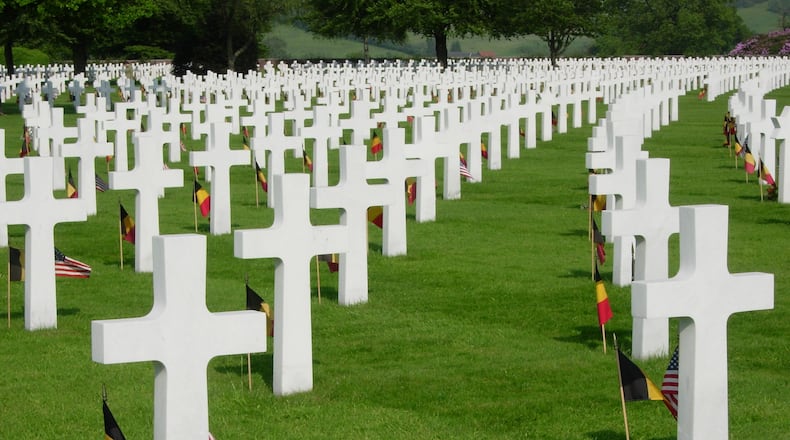Excerpted from former Atlanta Constitution Editor Eugene Patterson’s remembrance of a Georgia soldier under his command killed in action during World War II as published in “The Changing South of Gene Patterson.”
Amory Speight was riding in the middle of the front seat of his mortar jeep, driven by Cecil Burnett of Lexington, Mo., and flanked on the outside by Andy Popkie of Dunglen, Ohio, when we blasted into the darkness of the deep pine forest near Blaufeldern, two-thirds of the way to Crailsheim, with all machine guns firing.
We went into the forest very fast. We knew it was full of Germans because I had stopped the miles-long column of armor behind me to survey the woods line with binoculars and had seen, to my amazement, an American Army jeep rocketing out of the trees toward us. A tank company captain named O’Grady, whom I knew, huddled low in the jeep alongside a dazed driver as they screeched to a stop in front of my tank. Their windshield was shot to pieces. Both had ducked and somehow neither had been hit. “Those … woods are full of Germans,” O’Grady yelled, looked blank, and sped on.
The shattered windshield, the shouting captain, the fear of the black woods ahead, sent my eyes on a frantic search of the map. Sure enough, a cow path marked by dotted lines skirted the woods. Yet I had seen whole columns of tanks mired on just such dotted-line lanes that turned to mud. Dare I? Suddenly officers a mile behind my lead tank were radioing that they were drawing flank fire from enemy artillery. “Move this (expletive) column” was the basic entreaty. That cleared my mind.
We hadn’t come this far to skirt the Germans in the woods ahead. I radioed the reinforced platoon to follow me through the woods with all bow, coaxial and pedestal machine guns to alternate continuous fire, one vehicle’s guns directed to one side of the road and the next vehicle’s to the other, as each closed on the woods. My tank hit the dark pine tunnel at near 30 miles an hour with our three deafening machine guns unfolding a bright fan of tracer bullets ahead. A red blizzard of richochets from guns opening up behind us swept in front of the lead tank, enfolding us in fire. Crouched in the open on the tank’s rocking rear deck, I clung to the turret ring with one hand and fired my M-1 with the other at an occasional green-clad figure I could see scuttling through the thick trees beyond the ditches. It was a terrifying bedlam at desperate speed. The thought has occurred to me that the German who had shot up O’Grady’s jeep must have marveled at how ridiculously excessive was the wrath of God that so swiftly descended upon him. For whatever moments he still had to live, he would see mile after bellowing mile of armor approach and batter past in explosive retribution.
Once out of the woods I jumped down from the tank to count noses in my platoon’s passing vehicles. Burnett’s mortar jeep swerved to a stop. On his far right, Andy Popkie had taken a German bullet through both thighs. In the center seat, the same bullet had gone on to sever the femoral artery in Amory Speight’s right groin.
Speight’s whitening face watched me in silence as I tore away his combat suit. My compress was useless. Within a minute or two a medical half-track swung out of the column. Capt. Ronald Martin of Eden, N.Y., jumped down and took over. As the doctor went to work I squeezed Speight’s shoulder and told him I’d see him in Crailsheim. All he had was a leg wound and the doc would fix it up.
Ronnie Martin came to my command post as soon as he got into Crailsheim. “I’m sorry, Pat,” he said. “I couldn’t get hold of the artery. Your man died.”
The attack we’d pressed southward was fruitless. We angled back west of Crailsheim only as far as the village of Ilshofen before the German counterattacks caused our generals to fold their hand. They ordered us to fight our way back out to the north, past Gera Bronn, just as we’d fought our way south on the parallel route to Crailsheim. We came. We saw. We retreated. So much of the dying in war is senseless.
Luck left long avenues of life ahead for me. I have walked them … with two certainties about war lodged firmly in my mind.
First, there is the certainty that war is the ultimate obscenity… . Civilized ways simply must be found to settle man’s post-jungle conflicts.
Second, I am certain that pending the discovery of these civilized ways to deter violence, decency requires peaceful people to stand up and stop human predators from savaging the helpless when conscience is called to meet brute force with just strength. Shrinking from that duty has ill served peace, I think.
About the Author
Keep Reading
The Latest
Featured


